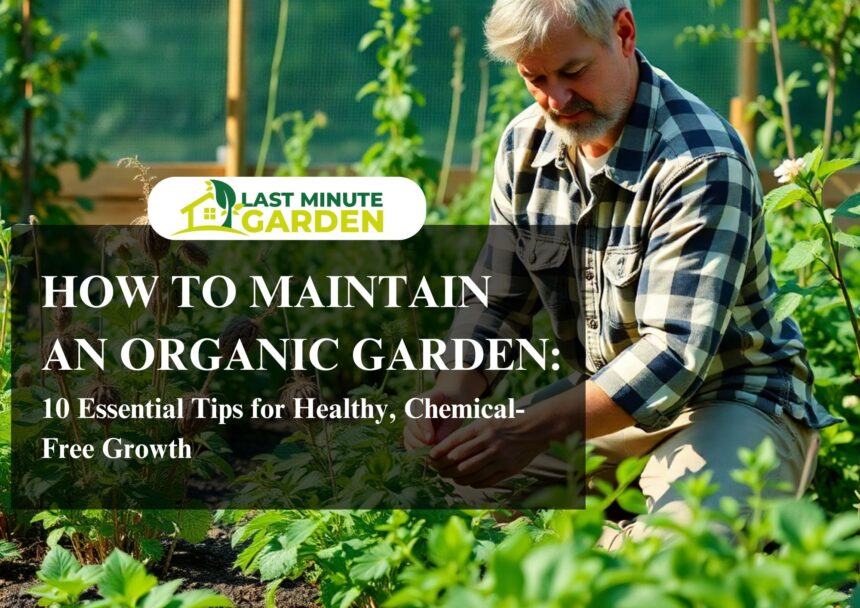Maintaining an organic garden is a rewarding experience that allows you to grow fresh, chemical-free produce while preserving the environment.
Adopting organic gardening techniques ensures your plants thrive naturally, regardless of whether you’re a beginner or an experienced gardener.
But can you maintain an organic garden without synthetic fertilizers and pesticides?
This guide will walk you through the essential steps to keep your organic garden flourishing all year round.
Essential Steps to Maintain an Organic Garden
Maintaining an organic garden requires a combination of good soil management, strategic planting, and natural pest control.

By following these essential steps, you can ensure your garden remains healthy and productive without the use of synthetic chemicals.
Here’s a breakdown of the key practices to help you sustain an organic and eco-friendly gardening space.
1. Build Healthy Soil
The foundation of a thriving organic garden is nutrient-rich soil. Instead of relying on synthetic fertilizers, enrich your soil naturally using compost, organic manure, and mulch.
Composting kitchen scraps and garden waste not only improves soil structure but also boosts its nutrient content.
Mulching helps retain moisture, suppress weeds, and regulate soil temperature, creating a balanced environment for plant growth and helping you maintain a flourishing organic garden.
2. Choose the Right Plants
Selecting plants suited to your local climate and soil type is crucial in organic gardening.
Opt for heirloom or non-GMO seeds that have not been treated with chemicals.
Native plants and disease-resistant varieties tend to require less maintenance and are naturally adapted to thrive in your region’s conditions.
3. Practice Crop Rotation
Crop rotation is an effective technique to maintain soil fertility and prevent pest infestations.
Growing the same crops in the same spot each season depletes nutrients and encourages pests and diseases.
By rotating crops, you disrupt pest life cycles and improve soil health. For instance, planting legumes after heavy feeders like tomatoes helps restore nitrogen levels in the soil.
4. Natural Pest Control Methods
Keeping pests at bay without using harmful chemicals is a key principle of organic gardening.
Introduce beneficial insects such as ladybugs and praying mantises that feed on common garden pests.
Companion planting is another effective method—basil deters aphids, marigolds repel nematodes, and garlic wards off many insects.
Additionally, homemade organic sprays using neem oil or a mixture of water, soap, and garlic can help control pest populations.
5. Water Wisely
Efficient watering practices are essential to maintaining an organic garden. Overwatering can lead to root rot while underwatering stresses plants.
The best method is deep, infrequent watering to encourage strong root development.
Using rainwater collection systems and drip irrigation minimizes water wastage and ensures your plants receive adequate moisture.
6. Weed Management
Weeds compete with your plants for nutrients, water, and sunlight. Instead of using chemical herbicides to maintain an organic garden, practice manual weeding, mulching, and using ground covers to suppress weed growth.
Regularly inspecting your garden and pulling out weeds before they seed can save you a lot of trouble in the long run.
7. Encourage Biodiversity
A diverse garden is a healthy garden. Incorporating a variety of plants, flowers, and herbs attracts pollinators like bees and butterflies while keeping pests in check.
Creating habitats such as small ponds or rock piles can also invite beneficial wildlife like frogs and birds, which help control pests naturally.
8. Make Your Own Organic Fertilizer
Chemical-free fertilizers, such as compost tea, fish emulsion, or seaweed extract, provide essential nutrients for plant growth. These are key to helping maintain an organic garden.
You can easily make compost tea by soaking compost in water and using the nutrient-rich liquid to feed your plants.
Regularly enriching your soil with natural fertilizers is key to maintaining an optimal nutrient balance, and supporting a thriving organic garden approach.
9. Regular Garden Maintenance
Consistency is key to a thriving organic garden. Regular pruning, monitoring for pests and diseases, and timely harvesting contribute to healthier plants.
Keeping an eye on plant health allows you to address any issues before they escalate, ensuring long-term success.
10. Sustainable Gardening Practices
To successfully maintain an organic garden, adopt sustainable gardening habits that promote long-term soil health and environmental balance.
Practices such as composting, mulching, and using natural pest deterrents help reduce waste and minimize ecological impact.
Additionally, rotating crops, intercropping, and planting cover crops can further enrich the soil and enhance biodiversity.
By incorporating these eco-friendly strategies, you can ensure that your organic garden remains productive and resilient year after year.
Conclusion
Learning how to maintain an organic garden takes patience and dedication, but the benefits are worth the effort.

By focusing on soil health, natural pest control, efficient watering, and biodiversity, you can enjoy a lush, chemical-free garden.
Whether you’re growing vegetables, herbs, or flowers, these organic gardening tips will help you cultivate a sustainable and productive space. Start implementing these strategies today and watch your garden flourish naturally!





